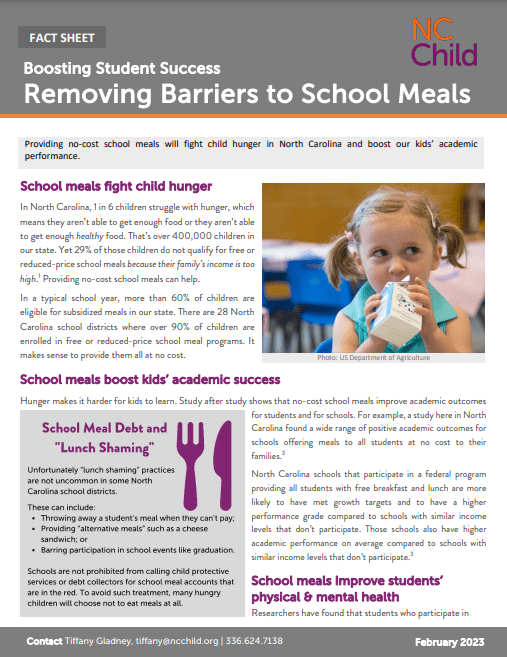School meals fight child hunger
In North Carolina, 1 in 6 children struggle with hunger, which means they aren’t able to get enough food or they aren’t able to get enough healthy food. That’s over 400,000 children in our state. Yet 29% of those children do not qualify for free or reduced-price school meals because their family’s income is too high.1 Providing no-cost school meals can help.
In a typical school year, more than 60% of children are eligible for subsidized meals in our state. There are 28 North Carolina school districts where over 90% of children are enrolled in free or reduced-price school meal programs. It makes sense to provide them all at no cost.
School meals boost kids’ academic success
Hunger makes it harder for kids to learn. Study after study shows that no-cost school meals improve academic outcomes for students and for schools. For example, a study here in North Carolina found a wide range of positive academic outcomes for schools offering meals to all students at no cost to their families.3
North Carolina schools that participate in a federal program providing all students with free breakfast and lunch are more likely to have met growth targets and to have a higher performance grade compared to schools with similar income levels that don’t participate. Those schools also have higher academic performance on average compared to schools with similar income levels that don’t participate.3
School meals improve students’ physical & mental health
Researchers have found that students who participate in free school meal programs have lower body mass index (BMI) and lower probability of obesity. Students who participate in free school meal programs also have fewer visits to the school nurse, as well as documented improvements in behavior and mental health indicators.4
School nutrition programs in North Carolina are struggling with meal debt
By November 2022, schools in North Carolina had accrued more than $1.3 million in unpaid meal charges this school year. It’s clear that families are struggling to pay for school meals. The simplest solution to school meal debt is to make school meals available to all students in public schools at no cost to their families.
Data Sources
1 Harvey, Lynn. “School Nutrition Operations during the COVID-19 Pandemic.” North Carolina Department of Public Instruction. https://webservices.ncleg.gov/ViewDocSiteFile/47721
2 2021 Youth Risk Behavior Study as reported by North Carolina Healthy Schools Whole Child Update, January 2023
3 Education Policy Initiative at Carolina. The Effects of the Community Eligibility Provision on Educational Outcomes for Students in North Carolina, 2020. https://epic.unc.edu/wp-content/uploads/sites/1268/2021/09/EPIC_CEP-Policy-Brief_FINAL.pdf
4 Food Research & Action Center “School Meals are Essential for Student Health and Learning,” 2019
Download
